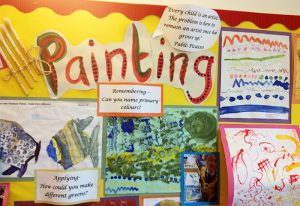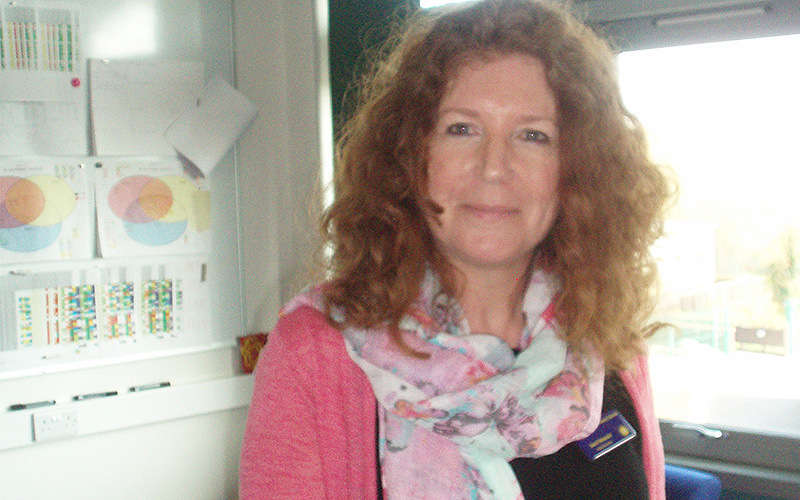Big changes have been taking place in Love Lane, Rye, with the linking of the three schools under the management of the Rye Academy Trust, changes that mean children aged 2-18 in the Rye area will now be offered a seamless transition from nursery to primary and primary to secondary education.
With so many changes taking place both nationally and locally in education, it seemed timely to speak to Jane Howard – the newly appointed head of the Pugwash Nursery and Rye Community Primary School – to find out more about her vision for the future, the challenges she faces and how we can provide support.
Howard has lived in the area for nearly 20 years. She moved from London in 1996 to take up a post leading infants at the Freda Gardham School in Rye. In 2008 she transferred to Rye Primary, first as assistant head and later as deputy head. She and Paul Reilly, the headmaster at that time, set up the school from scratch in just four days, transforming the empty classrooms into colourful, creative and stimulating learning environments.
The school, which is graded ”good” by Ofsted, is already over-subscribed and has to increase capacity. There are currently 360 pupils, but this figure will rise to 420 when new classrooms are built over the summer holidays in 2016, increasing each year group to two-form entry. This will free up space which can be used in a variety of ways, such as an art studio, break-out spaces, music sessions or clubs.
Pugwash Nursery, with Vicky Isted as early years leader and Katie Bull as manager, has 40 places on offer. The planned new build to bring the nursery into the primary school in September 2016 means that children will physically be together on the same site. The linking of resources will provide greater flexibility and learning opportunities across the age range. There is a lot of research demonstrating the importance of creative outdoor play spaces and Howard has plans to develop soft rubber crumb areas and install fixed play equipment, but funding is needed – any ideas/sponsorship welcome.
Collaboration with the other schools is already showing benefits. More able GCSE students are helping some children with reading and maths projects. The leadership teams are sharing expertise. The Studio School offers topic-based learning as does the primary, so there are opportunities for shared planning. There is a shared vision for the youth of the town and excitement about the possibilities that the union has created. Together they want to work to achieve an “outstanding” Ofsted rating.
Community projects have been underway, with the children inviting elderly people from Devenport House to come to the school for tea and to watch performances. Howard is keen to encourage further partnerships: speakers, outings, fund-raising events, sponsorship.
Parents are being encouraged to come in and spend time with the children – perhaps teaching them knitting, sewing or just having a conversation and taking an active role in their children’s education. Training is being given to parents by Rother Voluntary Action and a parents/teachers association is being formed.
Go back to school: how you can get involved
Like any school there are challenges to be met. This year alone the school has taken 15 new entrants in the final year. If pupils arrive from other schools without the same level of academic skill, they need extra support to help them to attain their goals. The number of children on free school meals is higher than the national average, which contradicts the impression many have of the Rye area being affluent.

Howard and the governors are keen to increase the number of after-school activities, with plans afoot to run a chess club – and if anyone is willing to help with this, or suggest other ideas, she would love to hear from you. Many of the children come from outside the immediate area – Rye Harbour and Camber – and transport can be a problem, but there are ways of funding this if children are keen to develop new skills outside school hours.
Volunteers are urgently needed to provide one-to-one or small group support in reading and maths. Just an hour a week helping a child, raising his or her confidence and having time to explain concepts, is an enormous help to the children and the staff, who are always under pressure to reach targets. Recruitment of volunteers involves an informal interview and a DBS check.
There are also vacancies for school governors, particularly from those in business or with a background in education. This would require a commitment to attend six evening meetings per year, involvement with events and activities and of course an interest in raising the aspirations of young people. If you would like to apply to become a governor, email Howard for an application form.
The initiative to unite the schools, spearheaded by Ann Cockerham, executive principal of the Rye Academy Trust, provides fantastic opportunities for the children and young people of Rye. Howard’s vision is to encourage life-long learning, to keep children engaged, raise aspirations and be proud of their achievements. I hope we can all help her.
Main photo: John Hart



